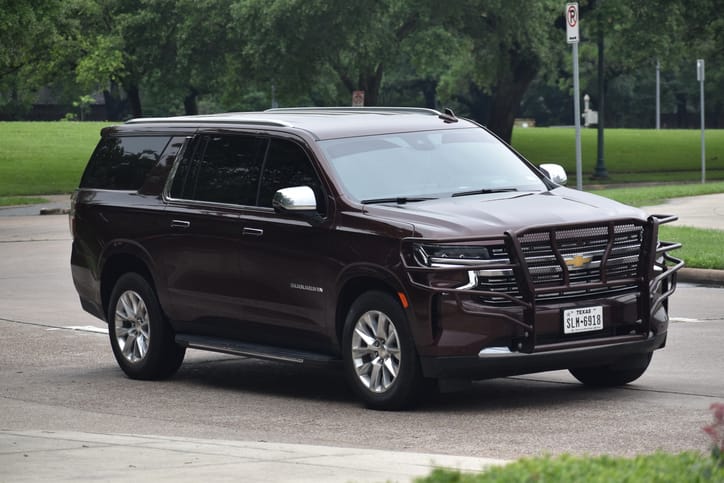Chevrolet Tahoe Hybrid: A Look Back at a Discontinued Eco-Giant

The Chevrolet Tahoe, a name synonymous with full-size SUVs, once offered a hybrid variant. While Chevrolet currently focuses on non-hybrid Tahoe models, the Tahoe Hybrid existed for a period, leaving its mark on the market. This article delves into the Chevrolet Tahoe Hybrid, exploring its features, performance, and the reasons behind its discontinuation.
A Hybrid Approach to a Classic SUV
Introduced in 2008, the Chevrolet Tahoe Hybrid aimed to bridge the gap between a powerful SUV and fuel efficiency. It utilized a combined powertrain system consisting of a gasoline engine and an electric motor. This allowed the Tahoe Hybrid to achieve a significant improvement in fuel economy compared to its conventional gasoline-powered counterparts.
Fuel Efficiency: A High Point
The Chevrolet Tahoe Hybrid boasted an estimated combined fuel economy of 20-21 miles per gallon (MPG) This was a substantial improvement over the non-hybrid Tahoe, which typically offered around 14-15 MPG combined. In city driving, the hybrid system offered even greater benefits, with estimates reaching up to 50% better fuel economy than the standard Tahoe.
Engine and Performance
The Tahoe Hybrid relied on a V6 gasoline engine coupled with an electric motor and a battery pack. While exact specifications varied by year, the general output placed horsepower around 270 and torque figures exceeding 300 lb-ft. This provided adequate power for most driving situations, though some reviewers noted a slight decrease in acceleration compared to the non-hybrid Tahoe, particularly when loaded with passengers or cargo.
Features and Technology
The Chevrolet Tahoe Hybrid offered a range of features designed for comfort, convenience, and safety. These included:
- Three-mode hybrid system: Drivers could choose between electric, gasoline, or a combination of both for optimal efficiency depending on driving conditions.
- Regenerative braking: This system captured energy during braking and coasting, converting it to electricity and storing it in the battery pack for later use.
- Spacious interior: The Tahoe Hybrid retained the signature spaciousness of the Tahoe, offering ample seating for up to eight passengers and significant cargo capacity.
- Advanced infotainment system: Touchscreen displays, Bluetooth connectivity, and a premium sound system were commonly available features.
- Safety features: Airbags, traction control, stability control, and anti-lock brakes were standard equipment. Some models offered advanced safety features like blind-spot monitoring and lane departure warning.
Reasons for Discontinuation
Despite its advancements in fuel efficiency, the Chevrolet Tahoe Hybrid ultimately met with limited success and was discontinued in 2014. Several factors contributed to this decision:
- High initial cost: The hybrid powertrain added a significant premium to the price tag compared to the standard Tahoe.
- Lower gas prices: During the Tahoe Hybrid's production years, gas prices fluctuated, making the fuel cost savings of the hybrid less appealing to some buyers.
- Limited cargo space: The battery pack placement in some models slightly reduced cargo space compared to the standard Tahoe.
- Technological advancements: As battery technology improved and automakers focused on alternative fuel options like plug-in hybrids, the Tahoe Hybrid's technology became less competitive.
The Legacy of the Chevrolet Tahoe Hybrid
While the Chevrolet Tahoe Hybrid is no longer available new, it serves as a reminder of Chevrolet's efforts in exploring fuel-efficient options for large SUVs. The lessons learned from the Tahoe Hybrid likely influenced the development of Chevrolet's current and future fuel-efficient vehicles.
Looking Forward: The Future of Large SUVs
Chevrolet currently offers the Tahoe with a variety of non-hybrid powertrains, including powerful V8 engines and a fuel-efficient 3.0L turbodiesel option. The focus on offering a range of engine options allows buyers to choose a Tahoe that best suits their needs and budget.
Looking ahead, the future of large SUVs likely involves continued development in electrification. Plug-in hybrid and even fully electric options may emerge in the coming years, offering both the power and space consumers expect from large SUVs with the environmental benefits of electric propulsion.
The Chevrolet Tahoe Hybrid may be a discontinued chapter in the Tahoe story, but it serves as a significant piece of the SUV's history, paving the way for future advancements in fuel efficiency and alternative powertrains for large SUVs.
